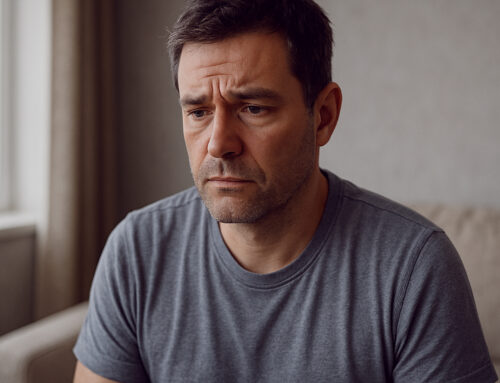How Trauma Affects Men’s Mental Health
Many men experience trauma that affects their mental health and daily lives. Understanding this impact is crucial for healing and breaking the stigma around men’s mental health.
Understanding Trauma
Trauma is the physical and emotional response to a deeply distressing event. It overwhelms a person’s ability to cope, leaving long-lasting effects.
Types of Childhood Trauma
Trauma in childhood comes in many forms:
- Physical abuse
- Emotional abuse
- Sexual abuse
- Neglect
- Witnessing violence
Each type leaves its mark, influencing mental health later on in life.
Emotional Impact of Trauma on Men
Difficulty in Regulating Emotions
Men with trauma often struggle to regulate their emotions. They may feel overwhelmed by anger, sadness, or fear, finding it hard to manage these feelings.
Negative Self-Perception and Low Self-Esteem
Trauma can lead to a negative self-image and low self-esteem. Men might feel unworthy or inadequate, which affects their confidence and interactions with others.
Trust Issues and Relationship Challenges
Men with trauma often have trust issues. Forming and maintaining healthy relationships becomes a challenge, leading to isolation.
Psychological Consequences of Childhood Trauma
Depression and Anxiety
Childhood trauma increases the risk of depression and anxiety. Men might experience persistent sadness, worry, and a sense of hopelessness.
Substance Use Disorders (SUD)
Trauma often leads to substance use disorders. Men might use drugs or alcohol to cope with emotional pain, creating further problems.
Posttraumatic Stress Disorder (PTSD)
PTSD is common in men with trauma. Flashbacks, nightmares, and severe anxiety are typical symptoms, disrupting daily life.
Cognitive and Behavioral Effects
Intrusive Thoughts and Flashbacks
Trauma can cause intrusive thoughts and flashbacks. Men might relive traumatic events, leading to intense emotional reactions.
Dissociation and Emotional Numbing
Some men experience dissociation, feeling detached from their thoughts and feelings. This emotional numbing makes it hard to connect with others.
Maladaptive Coping Mechanisms
Men often develop unhealthy coping strategies:
- Substance abuse: Using drugs or alcohol to escape emotions.
- Risky behaviors: Engaging in dangerous activities to cope.
Impact on Attachment and Relationships
Attachment Theory and Insecure Attachment Styles
Trauma affects how men form attachments. According to attachment theory, children with trauma often develop insecure attachment styles.
- Anxious-preoccupied attachment: Overly dependent on others for validation, often fearing abandonment.
- Avoidant-dismissive attachment: Suppressing needs and emotions, avoiding closeness to protect against rejection.
Men with insecure attachment styles struggle with relationships. They might avoid intimacy or become overly clingy, leading to unhealthy dynamics.
Sexual Dysfunction Resulting from Trauma
Physical Trauma and Sexual Dysfunction
Physical trauma, such as traumatic brain injury (TBI) or spinal cord injury (SCI), can lead to sexual dysfunction. This includes erectile dysfunction (ED) and premature ejaculation (PE).
Effects of Childhood Sexual Abuse
Childhood sexual abuse deeply impacts men’s sexual health. They may experience anxiety during sex, leading to ED or PE. Hypersexuality can also develop, used as a coping mechanism.
The Role of Parenting in Adult Mental Health
Influence of Positive Parenting
Positive parenting fosters emotional balance. Love and support create a foundation for healthy mental health in adulthood.
Consequences of Negative or Abusive Parenting
Negative or abusive parenting increases vulnerability to mental health issues. Traumatic childhood events leave lasting scars.
Pathways to Healing and Recovery
Recognizing and Acknowledging Trauma
The first step to healing is recognizing and acknowledging trauma. Understanding its impact helps in taking the next steps towards recovery.
Seeking Professional Help
- Therapy and Counseling: Professional help is crucial. Therapists can provide trauma-informed care to address both mental and sexual health concerns.
- Trauma-Informed Care: Tailored treatments help men navigate their emotions and heal effectively.
Learn more about What We Treat at Triony Behavioral Health
Building a Support System
Inform trusted family members and friends. Support groups can also provide a sense of community and shared experiences.
Self-Care and Stress Reduction
Engage in activities promoting well-being:
- Regular exercise
- Healthy eating
- Mindfulness practices
Reducing stress improves overall health and sexual performance.
Open Communication with Partners
Communicate openly with your partner. Sharing worries and setting boundaries creates a safe and consensual sexual environment.
Understanding how trauma affects men’s mental health is vital. Breaking the stigma and seeking support can lead to healing and better mental health. Check out Triony Behavioral Health for information on Mental Health treatment in Nashville.
FAQs on How Trauma Affects Men’s Mental Health
What are the effects of childhood trauma on men’s sexual function?
Childhood trauma can cause performance anxiety, reduced libido, and erectile dysfunction.
Can childhood sexual abuse cause sex addiction in men?
Yes, sexual abuse can lead to hypersexualized behaviors as a coping mechanism.
Can childhood trauma shape an individual’s personality as an adult?
Childhood trauma influences attitudes and behaviors in adulthood, but healing is possible with the right support.
What steps can men take to heal from childhood trauma?
Recognize the trauma, seek professional help, build a support system, practice self-care, and communicate openly with partners.
Healing from trauma is challenging but possible. No one has to face it alone. Seek help and support for a healthier future. For more information call 888-689-1432
Schedule consultation
Building a Foundation of Trust and Support
"In the midst of chaos, there is also opportunity." At the core of our services lies a deep commitment to creating a safe, supportive environment. We believe that a strong support system is crucial for healing and growth. Our team of compassionate professionals is dedicated to walking alongside you, offering guidance and understanding at every step of your journey.





